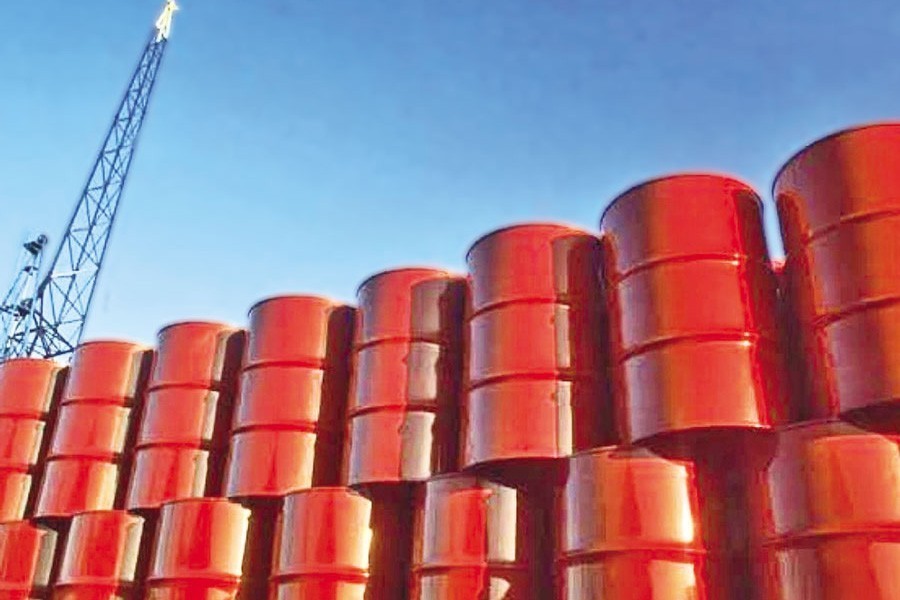The government now mulls over a hike in the prices of petroleum products on grounds of surging oil prices on the international market, officials say.
Consumer rights groups protest such move at a time when living is getting costlier constantly for price rises of almost all necessaries, while the government sides cites recurring losses incurred in local marketing of the imported fuels.
The state-run Bangladesh Petroleum Corporation (BPC) is readying a proposal to submit to energy and mineral resources division under the Ministry of Power, Energy and Mineral Resources for the hike, a senior BPC official told the FE.
Furthermore, the BPC demands authority to adjust petroleum prices once a month considering the price movements of oils on the global market, he said.
The state corporation is currently incurring loss worth around Tk 200-210 million every day due to surge of oil prices globally, said sources.
Besides, the corporation argues that a hike in oil prices is required to check smuggling of oil products to neighbouring India where diesel price is around Tk 118 per litre compared to Tk 65 in Bangladesh.
The proposal on oil-price hike follows a back-to-back raise proposal being prepared by state-run Petrobangla for natural gas.
Market sources say international oil market is currently witnessing an upturn and the price of Brent crude, the benchmark in international oil price, now hovers around US$ 85 per barrel, as on October 27, 2021.
The BPC incurs loss if the Brent crude price crosses US$ 69 per barrel, said sources.
Fixing the oil prices by the government or by the BPC will be a violation of the Bangladesh Energy Regulatory Commission (BERC) Act, said energy adviser of the Consumers Association of Bangladesh (CAB) Dr Shamsul Alam.
According to the BERC Act, he added, the energy regulatory commission only has the authority to fix energy and power tariffs, which include natural gas, electricity, petroleum oil, LPG (liquefied petroleum gas) etc.
"If the energy ministry of the government raises domestic oil price or the BPC moves to raise domestic oil prices of its own, they may have to face challenges in court for violating the law of the land," said the CAB leader.
"BPC must have to submit proposal to the BERC first and face public hearing before obtaining any decision over oil-price adjustments," he added.
Besides, there is no point in raising domestic oil prices now as the BPC attained profit over Tk 400 billion over the past several years when domestic oil prices were higher than international rates, said Mr Alam.
At present the retail price of diesel and kerosene is Tk 65 per litre each, octane and petrol prices are Tk 89 per litre and Tk 86 per litre respectively.
The government last raised the prices of these petroleum products by an executive order on April 24, 2016, and since then, the prices of these products remained unchanged.
Furnace-oil price on the retail market is Tk 53 per litre, which was raised from Tk 42 per litre on July 4, 2020.
The BPC now incurs loss of around Tk 15.0 per litre in diesel trading.
In furnace-oil trading it counts a loss of around Tk 6 per litre.
The BPC fixes the prices other than petroleum products, like jet fuel, marine fuel and bitumen on its own.
For the BPC, diesel is the key petroleum product that it imports from the international market most.
The BPC sells around 12,000-15,000 tonnes of diesel every day on the domestic market after import.
Market-insiders said the Brent crude price fell as low as $19.33 per barrel during April 21, 2020, due to acute coronavirus pandemic and subsequent lockdown globally to check its spread.
During the price fall last year, the corporation pocketed profit of around Tk 16 per litre on diesel sales and Tk 5.50 per litre in trading of the respective petroleum products.
Officials said the BPC had racked up hefty profits riding on sharp fall in oil prices on the international market over the past six years since 2015.
It, however, had incurred huge losses until late 2014 when the oil price was higher.
The corporation meets most of its furnace-oil demand from the Eastern Refinery Ltd (ERL), which produces around 350,000 tonne of furnace oil every year after refining crude oil.
Most of the country's octane and entire petrol and kerosene demands are met from the ERL output.
The BPC imports around 400,000 tonnes of furnace oil to generate electricity in government power plants.
The state-owned corporation currently imports around 5.0 million tonnes of diesel, 1.30 million tonnes of crude oil, 400,000 tonnes of furnace oil and 50,000 tonnes of octane annually.
The BPC alone procures around 90 per cent of the country's oil requirement, with the rest by the private sector that imports mainly furnace oil to run their power plants.


